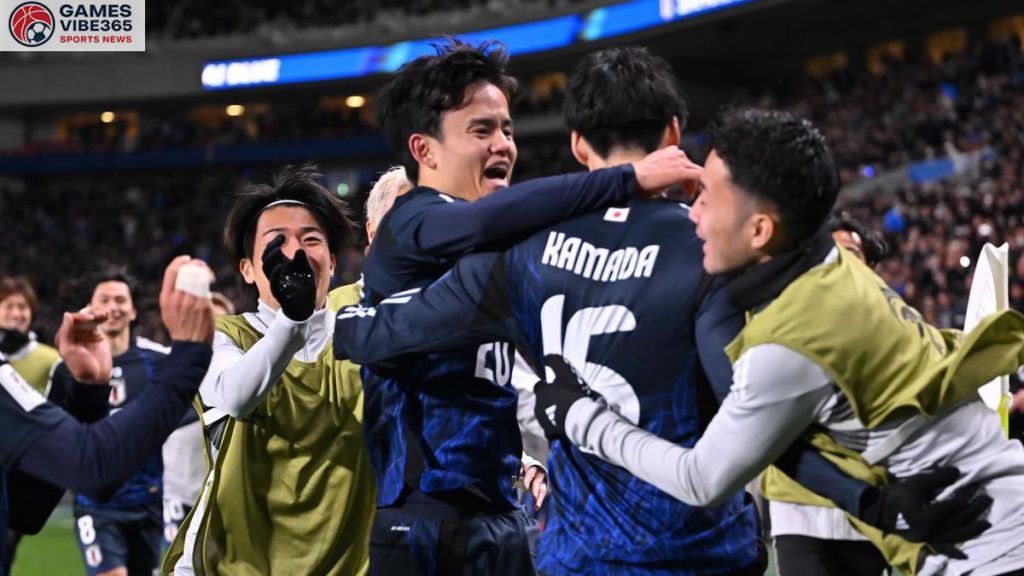
The Japanese national football team, popularly known as the “Samurai Blue,” has been a consistent presence on the world stage since its debut at the FIFA World Cup in 1998. Over the years, they have grown from underdogs into one of Asia’s most respected footballing powers. As the 2026 edition approaches, excitement in Japan is once again at its peak.
With North America hosting the grand tournament, Japanese fans are already preparing for another unforgettable journey that could push their team further than ever before. Japan’s path to World Cup qualification has been one of determination and discipline. Known for their technical skills, quick passing, and never-say-die spirit.
The Samurai Blue have shown that they can compete with the world’s best. In the 2022 edition held in Qatar, Japan stunned football fans worldwide by defeating European heavyweights Germany and Spain in the group stages, proving that they are not just participants but real contenders. That memory still fuels their ambition for 2026.
Japan’s Journey Towards the 2026 World Cup: Key Players Leading Japan’s Charge
One of the most exciting aspects of Japan’s 2026 campaign is the talent pool available to coach Hajime Moriyasu. Several young stars have made their mark in Europe’s top leagues, giving Japan a mix of experience and fresh energy. Takefusa Kubo, the Real Sociedad playmaker, continues to dazzle with his creativity, while Brighton’s Kaoru Mitoma brings pace and flair to the wings.
These players are expected to play a vital role in breaking down defenses at the World Cup. Defensively, Japan relies on a solid backline that includes veterans like Maya Yoshida and emerging talents from Bundesliga and Ligue 1 clubs. Their ability to stay compact at the back while quickly transitioning into attack is what makes the team dangerous.
Equally important is goalkeeper Zion Suzuki, whose presence ensures that Japan can hold their ground even against football’s strongest attackers. Alongside star names, Japan also benefits from team chemistry. Unlike many nations that depend heavily on one or two individuals, the Samurai Blue play as a unit. This collective strength could be their biggest weapon in the 2026 tournament.
Tactical Style and Strengths of the Samurai Blue
Japan’s tactical identity has always been about balance. They are known for their quick passing, intelligent movement, and pressing style. Coach Moriyasu has perfected a flexible approach where Japan can either play a possession-based game or hit opponents on the counter depending on the situation.

A crucial element of their style is discipline. Unlike teams that lose structure under pressure, Japan thrives in difficult situations. Their remarkable comeback against Spain in the 2022 World Cup group stage is a perfect example. Even when trailing, they remain calm, stick to their plan, and eventually find ways to surprise their opponents.
For the 2026 edition, Japan FIFA World Cup side ability to adapt tactically will be key. Facing world-class teams from Europe and South America requires more than talent it requires mental strength and flexibility. That’s an area where Japan has consistently impressed, and many analysts believe this could be the year they finally break past the Round of 16 barrier and make a deep run.
Fans, Culture, and Global Support for Japan
No discussion of Japan’s World Cup campaign would be complete without mentioning their fans. The Samurai Blue supporters are famous for their passion, respect, and unique culture of cleaning stadiums after matches. This tradition has earned admiration from around the globe, symbolizing the discipline and humility deeply rooted in Japanese society.
For 2026, thousands of fans are expected to travel to the host nations the USA, Canada, and Mexico to cheer for their team. The demand for World Cup match tickets involving Japan is already growing, particularly because their games tend to deliver unpredictable drama. Whether it is giant-killing performances against European powers or thrilling late comebacks, Japan’s matches are often must-watch events.
Japanese football culture has also been spreading globally, thanks to anime like Captain Tsubasa and the rise of Japanese players in European leagues. This cultural impact means that Japan enjoys support not only from its citizens but also from international fans who admire their spirit and unique style of play.
Also Read: Big names return as India announce strong squad for Asia Cup
Japan’s Realistic Expectations in the 2026 World Cup
While every fan dreams of seeing Japan lift the FIFA World Cup trophy, realistic expectations suggest a strong run into the quarterfinals is possible. The Samurai Blue have already proven that they can topple giants, but consistency across multiple knockout rounds will be the ultimate test. If players like Kubo, Mitoma, and Ritsu Doan find their rhythm, and the defense holds steady, Japan could become one of the tournament’s dark horses.
Moreover, Japan’s preparation includes a growing focus on youth development. The Japan Football Association (JFA) has invested heavily in grassroots programs, ensuring a constant supply of new talent. This long-term vision means that the team is not just aiming for success in 2026 but also building towards future tournaments.
Still, the excitement around this World Cup is unmatched. Japanese fans believe that if there was ever a moment for their team to make history, it is now. With discipline, talent, and an unbreakable spirit, Japan’s World Cup journey in 2026 could mark the beginning of a new era in Asian football.
FAQs: Japan 2026 World Cup Team
Q1: Has Japan qualified for the FIFA World Cup 2026?
A: Yes, Japan is among the first teams outside the host nations to secure qualification for the 2026 FIFA World Cup in North America. Their early qualification reflects the team’s strong performance in the Asian qualifiers.
Q2: Who are the key players in Japan’s 2026 squad?
A: Some of the standout players include Takefusa Kubo (Real Sociedad), Kaoru Mitoma (Brighton), Wataru Endō (Liverpool), Daichi Kamada (Crystal Palace), and Takumi Minamino (Monaco). The squad balances European-based stars with talented domestic players.
Q3: What is Japan’s tactical approach under coach Hajime Moriyasu?
A: Japan often plays in a 4-2-3-1 or 4-3-3 formation. The team can adapt depending on the opponent—either focusing on possession or playing on quick counters. Discipline, pressing, and fast transitions are key components of their style.
Q4: Who are Japan’s biggest rivals in the World Cup?
A: Japan could face tough opponents from Europe and South America, including teams like Germany, Spain, Argentina, and Uruguay. Regional rivals, such as South Korea, can also create high-stakes matches during the group stage.
Q5: What are the expectations for Japan in the 2026 tournament?
A: The realistic target is reaching the quarterfinals, as Japan has historically reached the Round of 16 but has not progressed further. With the current generation of players and tactical maturity, Japan is considered a potential dark horse for the tournament.
Q6: Do Japanese fans travel to support their team in World Cup matches?
A: Absolutely. Japanese fans are known for their passionate and respectful support. Thousands are expected to travel to the USA, Canada, and Mexico to cheer for the team, creating a vibrant and supportive atmosphere in stadiums.
Discrption:
Japan’s Samurai Blue gear up for FIFA World Cup 2026 with talent, passion, and ambition—ready to create history on football’s biggest stage.
